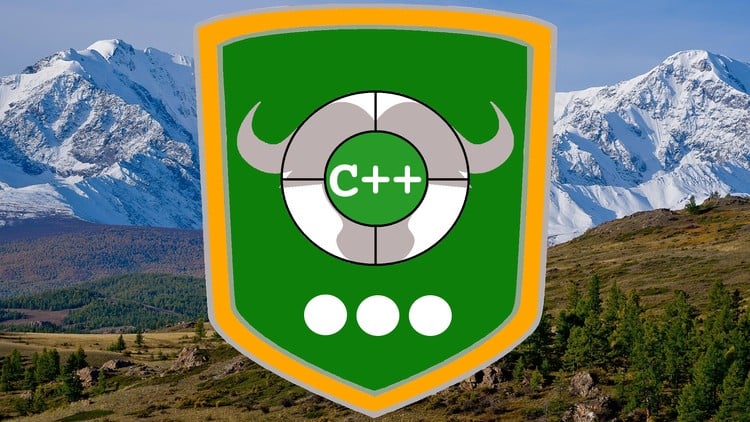
Applied Object Orientation
⏱️ Length: 7.5 total hours
⭐ 3.20/5 rating
👥 4,655 students
🔄 March 2024 update
Add-On Information:
Note➛ Make sure your 𝐔𝐝𝐞𝐦𝐲 cart has only this course you're going to enroll it now, Remove all other courses from the 𝐔𝐝𝐞𝐦𝐲 cart before Enrolling!
-
Course Overview
- Explores advanced C/C++ concepts for building robust, high-performance systems within the GNU development ecosystem.
- Bridges theoretical knowledge with practical application of object-oriented principles in system-level programming contexts.
- Focuses on leveraging the full power of GNU tools to optimize, debug, and manage complex C/C++ projects effectively.
- Designed for experienced developers seeking to elevate their expertise beyond basic syntax and intermediate patterns.
- Delves into the practical intricacies of designing and implementing industrial-strength C++ applications.
-
Requirements / Prerequisites
- Strong foundational knowledge of C and C++: Including pointers, memory management, templates, and basic OOP. This is not for beginners.
- Proficiency with the Linux command line: Comfort executing commands, basic scripting, and navigating the file system.
- Working knowledge of compilation and linking: Understanding how C/C++ source code is transformed into executables.
- Access to a GNU/Linux environment: With GCC, GDB, Make, and potentially other standard utilities installed.
- Familiarity with version control systems (e.g., Git): Basic repository operations are expected for project management.
-
Skills Covered / Tools Used
- Mastering advanced GCC compilation: In-depth exploration of optimization levels, link-time optimization (LTO), and targeted architectural flags.
- Expert-level GDB debugging: Utilizing advanced breakpoints, watchpoints, conditional debugging, reverse debugging, and core dump analysis.
- Crafting sophisticated GNU Makefiles: Developing highly modular, efficient, and parallelizable build automation for large-scale projects.
- Performance analysis with GNU tools: Employing Gprof, Valgrind (memcheck, callgrind) to identify and resolve performance bottlenecks and memory leaks.
- Seamless C and C++ interoperability: Integrating modern C++ code with legacy C libraries and direct POSIX system calls.
- Advanced memory management: Understanding custom allocators, memory pools, and techniques for reducing heap fragmentation in critical applications.
- Concurrency with POSIX threads: Implementing robust multi-threaded applications, managing synchronization primitives, and avoiding common concurrency pitfalls.
- Dynamic loading and shared libraries: Deep dive into creating, linking, and runtime loading of shared objects (.so) using dlopen/dlsym.
- Introduction to cross-compilation: Setting up and using GNU toolchains to build software for different target architectures.
- Applying modern C++ paradigms for system-level robustness: Incorporating RAII, smart pointers, and move semantics for safer and more efficient resource handling.
-
Benefits / Outcomes
- Architect professional-grade C/C++ systems: Design and implement complex, performant, and maintainable software solutions.
- Command the GNU toolchain: Become highly proficient in leveraging GCC, GDB, and Make for maximum development efficiency.
- Optimize C/C++ code for peak performance: Develop skills to analyze, profile, and significantly enhance the speed and resource efficiency of your applications.
- Debug intricate issues confidently: Master advanced debugging techniques to diagnose and resolve the most challenging system-level problems.
- Bridge C and C++ ecosystems: Effectively manage projects involving mixed C/C++ codebases and system interfaces.
- Elevate your problem-solving abilities: Gain a deeper understanding of system internals to tackle complex programming challenges with innovative solutions.
- Enhance career prospects: Prepare for demanding roles in embedded systems, high-performance computing, or operating system development.
- Contribute effectively to advanced open-source projects: Utilize your newfound expertise in GNU tools and C/C++ best practices.
-
PROS
- Highly practical and advanced content: Directly addresses the needs of seasoned C/C++ developers looking for deep technical enrichment.
- Comprehensive GNU toolchain focus: Provides invaluable expertise in essential, industry-standard development and debugging tools.
- “Applied Object Orientation” ensures relevance: Moves beyond theoretical OOP to practical, system-level design implications.
- Concise yet intensive format (7.5 hours): Offers significant knowledge acquisition in a time-efficient package for busy professionals.
- Timely and updated material (March 2024): Ensures the curriculum reflects current C/C++ standards and GNU tool capabilities.
-
CONS
- Steep learning curve for under-prepared students: The advanced nature and condensed format mean those without robust C/C++ fundamentals might struggle to keep pace, potentially impacting their learning experience.
Learning Tracks: English,Development,Programming Languages
Found It Free? Share It Fast!